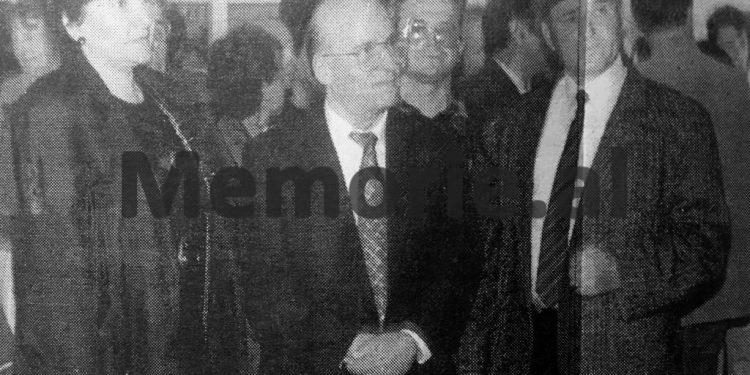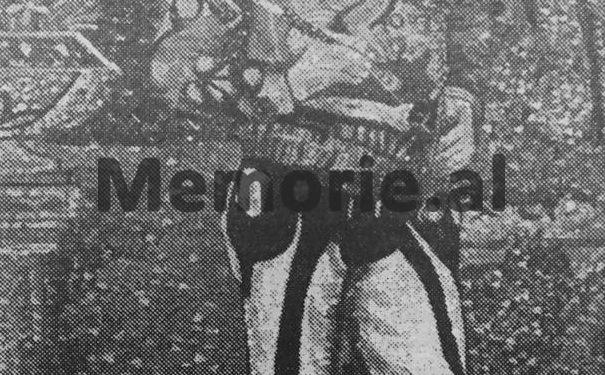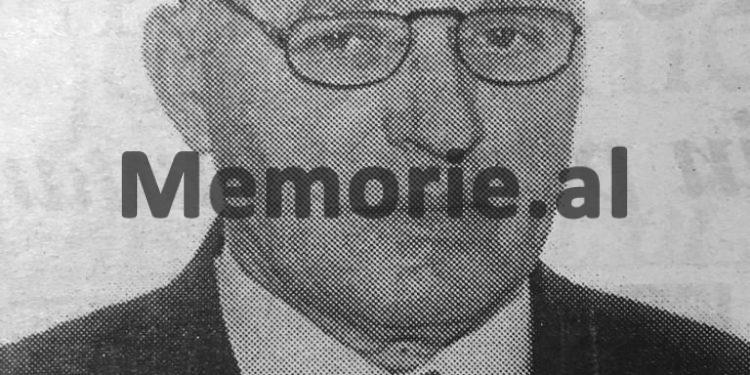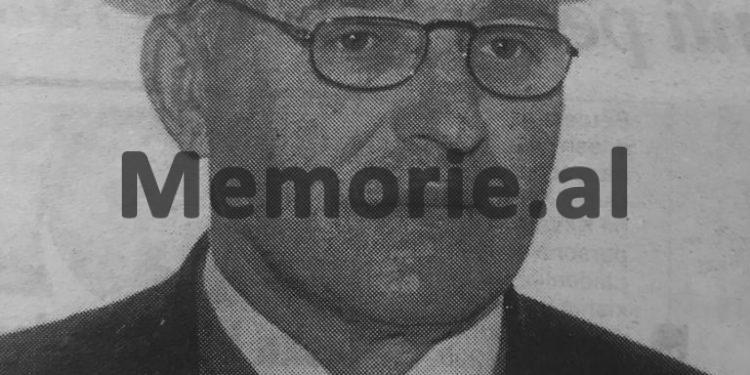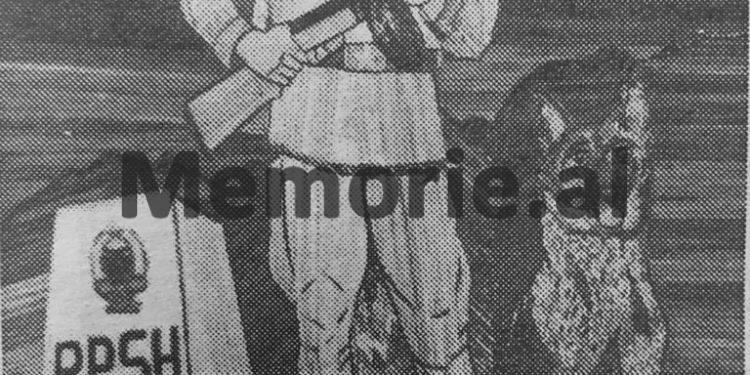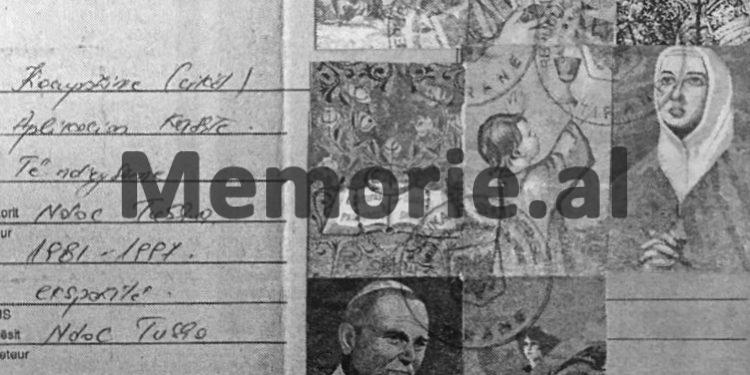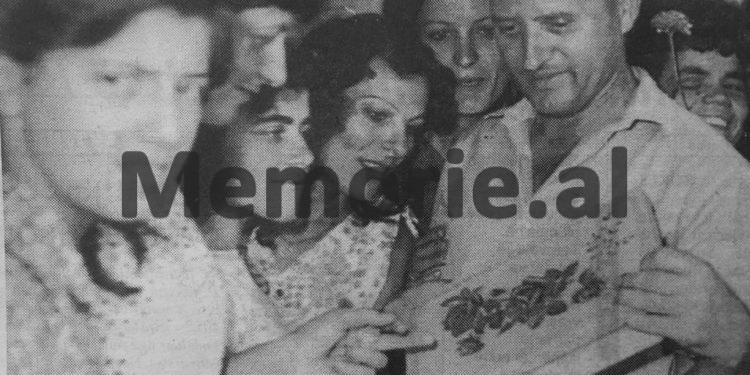Dashnor Kaloçi
Memorie.al publishes the unknown story of Ndoc Tushë, originally from Fush-Arrëz, who in September 1953, together with four other friends, were arrested by the State Security on charges of “laughing at a rally held in the city on the occasion of Stalin’s death “and were sentenced to severe imprisonment, starting at 18 years for” group leader “. The rare testimony of Ndoc Tusha, from the origin of the family that had in his gene the mastery of wood carving, the arrest and years of imprisonment in the Bulqiza Camp and the Craft Prison in Tirana, as well as the period after prison, when he stabilized in the city of Shkodra, where with the help of the former Chairman of the Executive Committee of the time, Mëhill Doçi, he was employed in the People’s Services Enterprise and the window of his shop near ‘Kafe e Madhe’, behind Rozafat Castle, was the place most visited by domestic and foreign tourists and at that time, by order of the senior leadership from Tirana, he prepared all the portraits of the main leaders, such as: Enver Hoxha, Mao Zedong, Chu En Lait, Kim Ir Sen, Lenin , Stalin, etc., which the senior leadership in Tirana needed to make gifts to the high communist personalities of different countries of the world.
In 1961, after I was released from political prison, with the help of the head of the Industry section, Nikola Papamiti, originally from Gjirokastra, and the chairman of the Executive Committee of the Shkodra District, Mëhill Doçi, my job was immediately opened. in the mastery of applying painting to straw. Until 1965 I worked for the People’s Services Company and at that time, behind Rozafat Castle, the window of my shop near the Great Cafe where I had exhibited about 180 kinds of works, was the most visited place by all local tourists and foreigners coming to the city of Shkodra. During those years I have prepared all the portraits of the main leaders, such as: Enver Hoxha, Mao Zedong, Chu En Lait, Kim Ir Sen, Lenin, Stalin, etc., which the senior leadership in Tirana needed to be made gifts to high communist personalities of different countries of the world. Only for Enver Hoxha I have prepared over 60 works, according to the orders I had from the Party Committee, doing it in different positions, alone or with Mao Zedong, Chu En Lain, etc. At the time when my shop window became a place of “pilgrimage”, the State Security appointed one of its civilian cadres, who regularly monitored me all the time tourists came there, seeing that I did not enter into various connections with ta. Although during those 30 or so years that I worked in that craft in the city of Shkodra I created a deep sympathy among the people and some senior cadres, sometimes I risked being punished again for “agitation and propaganda” by the Security or malicious colleagues of cmirëzinj. “One of them was a painter of the decor, FA, who came to my shop and after secretly taking the unfinished portrait of Enver Hoxha, sent it to the First Secretary, Sulejman Baholli, telling him how badly I had done it”.
This is how Ndoc Tusha, one of the most famous masters in Albania of applying straw painting, remembered for Memorie.al, who told for the first time all the vicissitudes of his life, since the sentence of ten years in prison in the town of Fush – Arrëzit, accused of laughing when Stalin died and then in the city of Shkodra, where he was several times handcuffed by the State Security. Who is Ndoc Tusha and what is the origin of his family? Where did he serve his 10-year sentence and how did he learn the art of applying straw painting? Who were the people who helped him in the city of Shkodra and those who wanted to put him back in prison? In how many countries of the world has Ndoc Tusha opened his exhibitions and what are the works that the former Prime Minister Pandeli Majko took to donate to the Pope of Rome, John Paul II? Regarding these full of facts and events from the life of the famous master, his interview in this article introduces us.
Mr. Ndoc, what is the origin of your family and where were you born?
Our family is originally from the district of Puka and I was born in that place in 1935.
When did you first start practicing your craft?
For the first time I started practicing this craft at a young age when we lived in the city of Puka and the reason for this was my family circle, which had that thing inherited from our ancestors. As a curiosity I am telling you that the artistic mastery of wood carving, embroidery in national costumes, handicrafts, etc., our house has had as a tradition for more than 300 years, which I continued and I as all the other members of my family.
What about your father, did he practice this skill?
Apart from my father Prend Tusha was a specialist as a carpenter and carpenter, all the other members of the family, like my two uncles, the brides and daughters of our house, are regularly engaged in the art of wood carving and embroidery in national costumes, etc… They made all kinds of artistic work, from dresses to woodwork, such as ceilings, forks, cradles, bridal crates, etc. In our house, since time immemorial, all the national costumes of our province have been made regularly. In this family tradition, as I said above, I grew up and educated myself, starting at the age of seven to do woodwork, such as children’s toys, etc.
Where were you educated and when did you first start work?
I received my first lessons in my hometown and then I finished high school in the town of Fushë-Arrëz, without leaving my job. In 1948, I started working for the first time in state enterprises in Fush – Arrëz, serving as a baker, bartender and head of the sector, in Trade. I worked in those jobs until June 1953, when I was arrested and sentenced to ten years in prison on charges of agitation and propaganda.
How did your arrest happen and more specifically, why were you charged?
On June 24, 1953, I and four other young men from Fush-Arrëz were arrested, accusing us of laughing at a rally in our town in March of that year on the death of Josif Visarianovich Stalin. In addition, I was accused of allegedly knowing about the escape from Albania of my two relatives, Dedë and Pashk Tusha, who fled abroad. I had the most serious accusation from all the members of the group, although during the whole two-three-month investigation period, I did not categorically admit it.
Was the accusation made against the four of you who laughed at the rally on the occasion of Stalin’s death true?
Absolutely the accusation made against me and the other members of the group had nothing real, but it was the reason for my arrest and conviction, as a sign of revenge for the escape of two relatives. But it was not the only thing that burdened me at that time, as my biography had begun to darken some time ago, with the shooting of our cousin, Prek Shtjefën Tushës.
When did you go to court and how much were you sentenced?
The trial against me and four other members of that so-called group took place in the town of Fush – Arrëz at the end of September 1953, and it became a public trial, or exemplary as it was said at the time. The court hearings lasted for three days in a row and at the end, the prosecutor in his claim requested 15 years of political imprisonment for me, while the court left me the sentence of 10 years in prison. The other four members of the “group” also received severe sentences, although they had other non-political charges, as I had. The one who was called president was sentenced to 18 years, while the other three were sentenced to 15, 8 and 3 years.
Where did you serve your sentence?
At first, I was sent to one of the prisons in the city of Shkodra and from there I was taken to the prison hospital, where I was surprisingly treated very well, although I never learned where that thing was coming from. In that context, in the good treatment I was given, I was asked where I wanted to serve my sentence and I told them that I wanted to go to Bulqiza Camp, as I had heard that there was something better treatment.
Did they meet your request?
I was immediately sent to the Bulqiza Camp, where work was being done to extract chromium ore from the depths of the subsoil, and temperatures in the winter season there reached minus ten degrees below zero. I did not know those difficult conditions, so I had asked to go there, where from the beginning I was assigned as Commander of the First Brigade, as there was the same organization as in the military units. It was in that camp where those convicted of political and ordinary crimes (as those who were not in politics were called) worked together, for the first time I learned the art of making straw paintings.
Who gave you the craft?
There at that time was like a prisoner a Greek citizen, who was shot in 1959. He was a master of straw painting and when I saw a frame he had made, for a week in a row I did not sleep at all, wondering how I could do that too. And I achieved the goal very quickly, realizing that straw application technique, almost the same as it does, to say the least. I say so, since in the realization of the first frameworks, I had many requests from the camp command staff and ordinary policemen, to whom I realized all of them, of course donating them without any reward.
How long did you stay in the Bulqiza camp?
I stayed in Bulqiza until 1957 and at that time, after the separation of the convicts, political and ordinary, I was brought to Tirana in the Craft Prison. At that time in that camp the straw works department was opened, where among the four convicts who were assigned there, I was the most important, because in addition to frames, I had also started to make paintings.
How long did you work in that prison?
With that job with which I had truly become a master, I continued to deal until January 11, 1961, when I was released from prison.
After you were released from prison, where did you settle?
After I was released from prison I went to the city of Shkodra and there I quickly prepared 50 samples of straw frames, which I went and handed over to the office of the Industry section at the Executive Committee of the city of Shkodra, which at that time was headed by Nikola Papamiti, originally from Gjirokastra.
How were they received there, what did they tell you?
Although I was released from political prison, the head of the district industry and the chairman of the district executive committee, Mëhill Doçi, liked my work immensely and within two hours, they ordered the Craft Company to open the place for me. work. So, at their behest, for a year he pays me a basic salary, leaving me to work and set up the straw works application department, in order to teach others and create many jobs, as job applications in at that time they were large. For this at that time I had the generous help of the vice president of Crafts and Metals, Fadil Hoxha and Ali Haveri. /Memorie.al
Continues in the next issue




